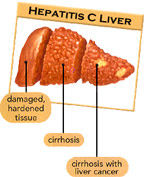


Hepatitis C Overview
 Hepatitis Cas a term refers to an infectious illness caused by HCV (Hepatitis C) virus affecting the liver, which causes inflammation of liver called as Hepatitis.
HCV (Hepatitis C) Virus is unrelated to hepatitis A & B virus. HCV virus isa (RNA) virus. It is difficult for the human immune system to eliminate the virus from the body, and infection with HCV usually becomes chronic. Over decades, chronic infection with HCV damages the liver and can cause scarring of liver, which can lead toliver failure in some people
The hepatitis C virus is spread by blood-to-blood contact. Most people have few, if any symptoms after the initial infection, yet the virus persists in the liver in about 85% of those infected.
Hepatitis Cas a term refers to an infectious illness caused by HCV (Hepatitis C) virus affecting the liver, which causes inflammation of liver called as Hepatitis.
HCV (Hepatitis C) Virus is unrelated to hepatitis A & B virus. HCV virus isa (RNA) virus. It is difficult for the human immune system to eliminate the virus from the body, and infection with HCV usually becomes chronic. Over decades, chronic infection with HCV damages the liver and can cause scarring of liver, which can lead toliver failure in some people
The hepatitis C virus is spread by blood-to-blood contact. Most people have few, if any symptoms after the initial infection, yet the virus persists in the liver in about 85% of those infected.
What causes of hepatitis C?
Top
Hepatitis c is caused due to the infection of HCV (hepatitis C) Virus.
How is Hepatitis c transmitted?
Top
- As Hepatitis C virus is a blood-borne virus the principal mode of transmission from one person to another is via blood or fluids contaminated with blood. So the primary source is through blood transfusion.
- Infected needles specially healthcare workers and drug abuse
- In frequently the transmission is from an infected mother to a newborn child, which occurs during or shortly after birth.
- Semen, which contain small amounts of blood, and saliva that is contaminated with blood also carry the virus. The virus may be transmitted when these fluids come in contact with broken skin or a mucous membrane (in the mouth, genital organs, or rectum) of an uninfected person.
What are the sign and symptoms of Hepatitis C?
Top
HCV infection usually is asymptomatic during the early acute phase of the infection. These symptoms typically develop 5-12 weeks after exposure to HCV. Some people describe the symptoms as being flulike. The symptoms may last a few weeks or months.
- Malaise,
- Loss of appetite,
- Nausea,
- Vomiting,
- Body aches,
- Mild fever,
- Dark urine,
- Jaundice.
- Itchy skin
- Abdominal pain
- Loss of appetite,
- Anaemia,
- Weight loss, wasting,
- Persistent Jaundice,
- Fluid retention causing ascites (swelling of the belly) and sometimes the legs,
- Osteoporosis,
- Weight gain due to ascites,
- Difficulty with blood clotting,
- Vomiting with blood in the vomit,
- Bleeding from the nose, mouth, or rectum; or blood in the stool
- Breast enlargement in men,
- Rash on the palms,
- Spider-like blood vessels on the skin,
- Decreased absorption of vitamins A and D can cause impaired vision at night,
- Spleen enlargement,
- Hepatic encephalopathy (excessive sleepiness, mental confusion, and in advanced stages, development of coma)
- In certain cases it can lead to liver cancer.
How is Hepatitis C diagnosed?
Top
Hepatitis C infection can be diagnosed with blood tests. These tests can detect pieces of the virus in the blood (antigens), antibodies against the virus, and viral DNA ('viral load').
Imaging studies like ultrasound and CT scan may be conducted to review the liver damage in chronic infection.
What is the role of Homoeopathy in Hepatitis C?
Top
As described in the article above causes hepatitis C can form a complex disease state Homoeopathy follows an individualistic approach towards patients suffering from hepatitis C we believe that every individual is different and thus a full in-depth case study is the first step. Then referring to the stage of disease and individual response a particular line of treatment is adopted.
A broad criterion of how the homoeopathic medicines act in cases of hepatitis C is mentioned below. The response to treatment can differ from one individual to another patients are advised to consult so that the mode of treatment can be discussed pertaining to their particular case.
Homoeopathy medicines act by;
Relieving Symptoms like:
Homoeopathy medicines act by;
Relieving Symptoms like:
- Myalgia (muscle pain)
- Arthralgia (joint pain)
- Fatigue (extreme tiredness)
- Anorexia (having no appetite)
- Nausea and vomiting
- Diarrhea
- Fever (usually low-grade and most common in hepatitis A and E)
- Pain in the upper belly on the right side, usually mild and constant
- Jaundice
- Dark-colored urine
- Light-colored stools
- Liver–spleen enlargement
- Ascites
Homoeopathic medicines have proven their efficacy in all sought of liver conditions and help by reviving the liver cells and helping in restoring their functions back to normal. It helps by increasing patients immune response thus reducing the virus load and improving the overall health of liver.
- If homoeopathic treatment is sought early it helps in preventing the progress of disease and preventing any complications (Liver cirrhosis, failure, cancer) from occurring, which are usually associated with the disease.
- We at DRSS provide our patients with diet charts, exercise schedules and guide them how to modify their lifestyle so that better results can be achieved.
- Our medicines can be started with conventional treatment depending upon the disease state and case.
- Homoeopathic medicines if taken under proper guidance from a well-qualified professional are extremely safe and have no side effects

Hepatitis C




